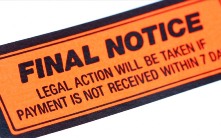How to Pay Off Debt?
 Dealing with debt collectors can be a very unpleasant experience. Knowing how to pay off debt the smart way can save you money, time and agony.
Dealing with debt collectors can be a very unpleasant experience. Knowing how to pay off debt the smart way can save you money, time and agony.The best way to pay defaulted accounts that went to collection is to settles for less, and then pay it in a one-time lump sum.
Negotiating a settlement
Collection companies usually buy your debt from the original creditor for a few cents on the dollar. As the debt gets older, you have more negotiating power so you should be able to agree on anything between 25% – 40% the original debt. Offer them 20%. Pretend like you’re broke and that maybe you can pay them 35%.
When you negotiate a settlement, it’s important to know how much the collection agency has paid for your debt, and how much they stand to gain by agreeing to your offer.
- Debts that have been recently charged-off: ~ 7 cents on the dollar.
- Older debts or accounts sold a second time: ~ 2 cents on the dollar.
- Years-old or out-of-statue debts: less than a penny on the dollar.
So even of you agree to pay “only” $250 on a $1,000 debt, they still make a profit of $180 – $230.
For debts that are “single items” such as unpaid medical bill, utility bills etc (rather than charged-off credit cards) it’s worth trying to negotiate a Pay for Delete Agreement, in which the collection agency agrees to completely remove the item from your credit report in return for you paying the debt in full (or a considerable portion of it). If they agree and the negative item is removed – your score will increase immediately!
Never agree to a monthly payment plan. Insist on a one-time lump sum. Demand that the debt will be considered as “Paid in Full”, and that the collection agency will report so to the credit bureaus.
Have them send you a written and signed agreement on the company’s formal letter paper. NEVER pay a cent before you have their letter with letterhead, confirming that the debt is regarded as “Paid in Full”.
Make a photocopy of all correspondence with them, and keep it forever!
Why not a monthly payments plan?
When it comes to collection agencies, monthly payments plan is a very bad choice for two reasons:
- Collection agencies are notoriously known to take your monthly payment for a few months and then re-sell the account to another collection agency. The new collection agency is not obliged to keep your agreement, and you’ll need to negotiate a new settlement from scratch. Down the drain go the payments you’ve made.
- Their monthly payments plans tend to have outrageous interest rates and fees. You might pay for two years and the balance doesn’t go down.
If you must pay in monthly payments, have them send you a statement every 3 or 4 months, so that you can track your balance and make sure it goes down. Include the statement requirement as part of the written agreement.
Making the payment
Never give debt collectors your bank account number. Pay only with cashier’s check or USPS money order. If they tell you that the only way they can accept payments is from your bank account – they’re lying!
Tips for dealing with debt collectors
- Never deal in good faith with a debt collectors. Most are not to be trusted.
- Never relay on any promise made over the phone. Insist on having a written confirmation to any promise a debt collector makes.
- Debt collectors have absolutely no legal power over you. They like to threaten a lot about liens, wage garnishment etc. The ONLY thing that they can do is file a law suit.
- Debt collectors like to create a sense of urgency. Never fall for this false pretense. The debt waited a few years, and it can certainly wait a few more days.
- When you make a first contact with a debt collector, use an outside line (not your home’s land line or your cellular). If the call doesn’t go as planned, simply hung up.
How to know if a debt collector threats are real
Debt collectors threaten people with legal actions regularly. In many cases, the treat is only a part of their scare tactics and is not real.
When a debt collector calls and makes a legal threat, a quick way to tell if the threat is real is to ask them: “May I have the full name of your firm’s attorney and his/her license in the PA bar association?”
- If the legal threat is real – they must provide this information.
- If they don’t – then the legal threat is bogus.
Return from How to Pay Off Debt to How to Repair Bad Credit Page
Return from How to Pay Off Debt to Credit Report 101 Home Page
